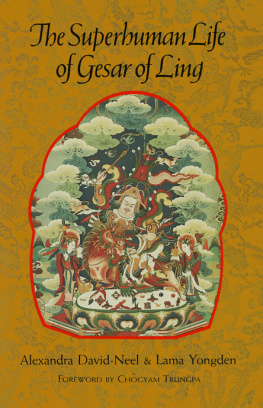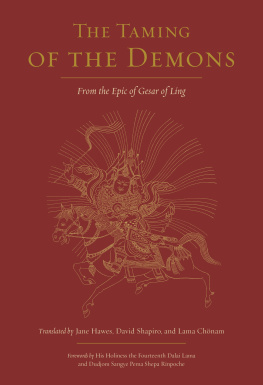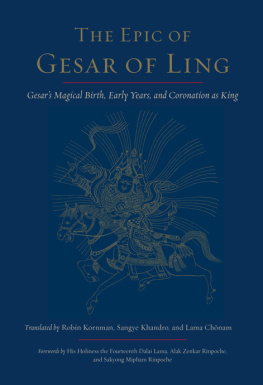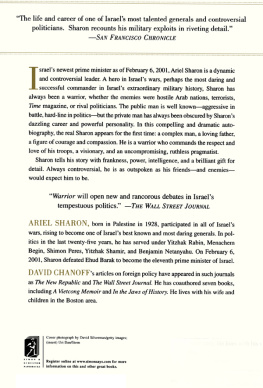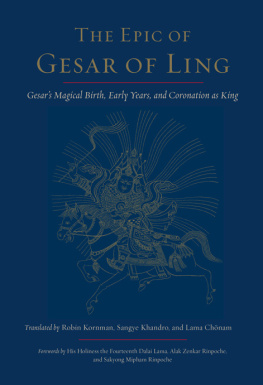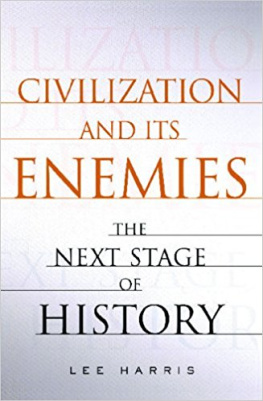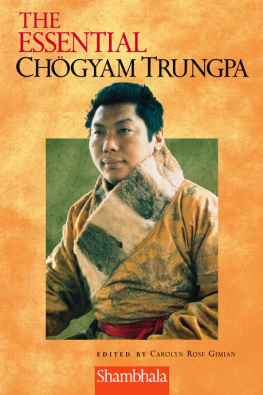ABOUT THE BOOK
King Gesar, renowned throughout Tibet and Central Asia, represents the ideal warriorthe principle of all-victorious confidence. As the central force of sanity, he conquers all his enemies, the evil forces of the four directions, who turn peoples minds away from the true teachings of Buddhism. These enemies graphically represent the different manifestations of cowardly mind.
As Chgyam Trungpa explains in the Foreword:
When we talk here about conquering our enemy, it is important to understand that we are not talking about aggression. The genuine warrior does not become resentful or arrogant.... It is absolutely necessary for the warrior to subjugate his own ambition to conquer at the same time that he is subjugating his other more obvious enemies. Thus the idea of warriorship altogether is that by facing all our enemies fearlessly, with gentleness and intelligence, we can develop ourselves thereby attaining self-realization.
The legends of Gesar usually take weeks for a bard to recount. Filled with magic, adventure, and the triumphs of this great warrior-king, the stories will delight allyoung and old alike.
Sign up to receive news and special offers from Shambhala Publications.

Or visit us online to sign up at shambhala.com/eshambhala.
The Superhuman Life of
GESAR OF LING

ALEXANDRA DAVID-NEEL & THE LAMA YONGDEN
Foreword by
CHGYAM TRUNGPA
Translated with the collaboration of
VIOLET SYDNEY

SHAMBHALA
Boston & London
2013
SHAMBHALA PUBLICATIONS, INC.
Horticultural Hall
300 Massachusetts Avenue
Boston, Massachusetts 02115
www.shambhala.com
Foreword 1981 by Chgyam Trungpa
All rights reserved. No part of this book may be reproduced in any form or by any means, electronic or mechanical, including photocopying, recording, or by any information storage and retrieval system, without permission in writing from the publisher.
LIBRARY OF CONGRESS CATALOGING-IN-PUBLICATION DATA
Gesar. English.
The superhuman life of Gesar of Ling.
Reprint. Originally published: Boulder: Praja Press, 1981.
eISBN 978-0-8348-2924-4
ISBN 1-57062-622-7 (pbk.)
I. David-Neel, Alexandra, 18681969. II. Yongden, Albert Arthur. III. Sydney, Violet. IV. Title.
[PL3748.G4E5 1987] 87-9648
895.41
BVG 01
This book contains diacritics and special characters. If you encounter difficulty displaying these characters, please set your e-reader device to publisher defaults (if available) or to an alternate font.
I N ORDER for us to understand Gesar of Ling, the great warrior king of Tibet, it is necessary first to understand the principle of warriorship itself. This concept has for centuries been the heart of the lineage of Gesar of Ling, whose Tibetan descendants still exist today. Although it has been somewhat influenced by Buddhism, as has virtually all of Tibetan culture, basically the principle of warriorship stands on its own.
By warriorship we are not particularly talking about the skills necessary to wage war in the conventional sense. We are not talking about learning how to handle lethal weapons and crank up our aggression and territoriality so that we can burst forth and conquer all our enemies. Warriorship here refers to realizing the power, dignity and wakefulness that is inherent in all of us as human beings. It is awakening our basic human confidence which allows us to cheer up, develop a sense of vision and succeed in what we are doing.
Because warriorship is innate in human beings, the way to become a warrioror the warriors pathis to see who and what we are as human beings and cultivate that. If we look at ourselves directly, without hesitation or embarrassment, we find that we have a lot of strength and a lot of resources available constantly. From that point of view, if we feel we are without resources, if we feel incompetent or as if we were running out of ideas, it is said that we are being attacked by the enemy of warriorship: our own cowardice. The idea of warriorship is that because of our human potential we can go beyond that, step over the enemy of cowardly mind and discover further banks of resources and inspiration within ourselves.
Cowardly mind is based on the fear of death. Ordinarily we try to ward off any reminders that we are going to die. We constantly produce artificial environments to shield ourselves from any harsh edges. We weave ourselves warm cocoons in which we can live and feel comfortable and sleepy all the time. We try to keep everything under control so that nothing unexpected will pop up and give us a nasty shock, reminding us of our impermanence, our mortality. By doing this we are trying to defend ourselves from death, which we could say is the opposite of celebrating life. By maintaining our defensive attitude we keep ourselves surrounded by a familiar fog. We wind up breeding depression and general unhappiness. In fact, that unceasing atmosphere of depression is what makes our little created environments feel so familiar and nestlike. But because it is based on struggle, this cowardly approach of ours is very far from the sense of real joy and playfulness that is associated with warriorship.
Becoming a warrior means that we can look directly at ourselves, see the nature of our cowardly mind, and step out of it. We can trade our small-minded struggle for security for a much vaster vision, one of fearlessness, openness and genuine heroism. This doesnt happen all at once but is a gradual process. Our first inkling of that possibility comes when we begin to sense the claustrophobia and stuffiness of our self-imposed cocoon. At that point our safe home begins to feel like a trap and we begin to sense that an alternative is possible. We begin to have tremendous longing for some kind of ventilation, and finally we actually experience a delightful breath of fresh air coming into our stale nest.
At this point we realize that it has been our choice all along to live in this restrictive, and by now somewhat revolting, mentality of defensiveness and cowardice. Simultaneously we realize that we could just as easily switch our allegiance. We could break out of our dark, stuffy prison into the fresh air where it is possible for us to stretch our legs, to walk, run, or even dance and play. We realize that we could drop the oppressive struggle it takes to maintain our cowardice, and relax instead in the greater space of confidence.
It is important to understand what we mean by the confidence of the warrior. The warrior is not developing confidence in anything. He is not simply learning one skill, such as swordsmanship, in which he feels he could always take refuge. Nor is he falling back on some mentality of choicelessness, a sense that if only he can hold out long enough and keep a stiff upper lip, then he is bound to come out all right. Those conventional ideas of confidence would simply be further cocoons, based once again on yet further styles of defensiveness and fundamental aggression.
In this case we say the warrior has self-existing confidence. This means that he remains in a state of confidence free from competition and any notion of struggle. The warriors confidence is unconditional. In other words, because he is undistracted by any cowardly thoughts the warrior can rest in an unwavering and wakeful state of mind, which needs no reference points whatsoever.
On the other hand we do not mean to say that once the warrior has uncovered his innate confidence there is nothing left for him to do. In many ways the path of the warrior is very similar to the Buddhist notion of the bodhisattva path of selfless action. The bodhisattva is a practitioner who isnt satisfied with the possibility of liberating himself from the pain of samsara, but heroically commits himself not to rest until he has helped save all sentient beings. In the same way the confident warrior does not simply feel proud of having seen the nature of his cocoon and stepped out of it. He cannot rest in any sense of smugness at his achievement, or even in the sense of freedom and relief itself. Rather his understanding and personal experience of the claustrophobia of cowardly mind serve as an inspiration for the warrior to free others as well as himself. He actually cannot ignore the suffering and depression he sees in those around him. So from his unconditional confidence, spontaneous compassion naturally arises.
Next page
